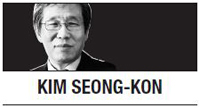 South Korea has been drawing attention around the world thanks to its miraculous economic success, internationally acclaimed electronic products by Samsung and LG, and the enormous popularity of K-pop.
South Korea has been drawing attention around the world thanks to its miraculous economic success, internationally acclaimed electronic products by Samsung and LG, and the enormous popularity of K-pop. Korean boy bands EXO and BTS are currently all the rage in the US. The news that Han Kang’s “The Vegetarian” won the prestigious Man-Booker International Award also prompted about 400 articles on Korean literature by various international media outlets. Recently, Pyun Hye-young, too, was in the spotlight for winning the Shirley Jackson Award in the US. The whole world knows about Korea now.
However, it was not always like this. When I was pursuing my graduate studies in the US in the 1970s, few Americans had heard about Korea or knew where Korea was. As for the Korean studies program, there were only a few American professors of Korean literature and history: Edward Wagner at Harvard, Gari Ledyard at Columbia, and Peter Lee at the University of Hawaii come to mind. They were the three doyens who served as the cornerstone of the Korean studies program at American universities.
Later, Marshall Pihl, David McCann and Mark Peterson, all of whom were Wagner’s former students, began teaching Korean literature and history. Prominent scholars such as John Duncan, Carter Eckert and Michael Robinson also joined the camp.
Today, however, there are more than 30 professors of Korean literature in North America alone. When I met them, I was greatly encouraged by their passionate enthusiasm for and sheer dedication to Korean literature and culture. Compared to professors of Korean politics, they seldom speak out when South Korea needs backing diplomatically, but American professors of Korean literature are still valuable assets, not only to the scholarship of Korean studies but also to the future of South Korea in general.
As much as I am proud of these second-generation professors of Korean literature, I find some inherent problems in the Korean literature programs at American universities. When I visited European universities in cities like London, Paris, Rome, Moscow, Prague, Malaga and Warsaw, I met so many Europeans students studying Korean literature.
At American universities, however, I see mostly Korean students and heritage students who are comfortable with the Korean language.
The reason is obvious. Korean students, who may not be fluent in English, want to get a good grade by taking a Korean literature course, whereas heritage students who are not good at Korean are reluctant to sign up for Korea-related courses. To make matters worse, Korean economy or history courses attract the interest of American students, but not Korean literature courses.
Another problem is that it is hard to find professors who have specialized in contemporary Korean literature at American universities. Most of them majored in either premodern Korean literature or colonial period Korean literature.
The problem is that if you major in premodern Korean literature, professors of Chinese literature would not acknowledge you as a serious scholar, saying, “It is in classical Chinese literature already.” When you major in Korean literature of the colonial period, professors of Japanese literature would say the same thing, or they might have the impression that Korean literature is still under the influence of Japanese literature.
That is why we urgently need specialists in contemporary Korean literature at American universities because South Korea has produced a plethora of stellar writers since liberation. Besides, they have beautifully rendered the social milieu of each important period in recent Korean history, such as the postwar period, the military dictatorship, the rapid industrialization, the democratization, and the postmodern electronic age.
We cannot let American students know about today’s Korea if we cling to the premodern or colonial period only.
Another innate problem is that older professors of Chinese and Japanese studies do not seem to be aware of the remarkable accomplishments and recent changes of South Korea, and therefore do not treat the Korean studies program accordingly.
Compared to Chinese or Japanese studies, therefore, Korean studies programs still tend to be embarrassingly small and inconspicuous. In the Department of East Asian Languages and Literatures, sometimes there is rivalry between Chinese studies and Japanese studies. Sandwiched between the two, Korean literature programs often do not have enough space to stretch.
If they could overcome these problems, Korean literature programs would surely play a crucial role in promoting Korean values, culture, society and history because literature is the best medium to learn about a country comprehensively. That is why Korean literature programs need constant moral and financial support from sponsoring agencies and concerned institutions. Unlike Korean economy, politics or history, Korean literature cannot be prosperous without strong support.
Of course, not all American universities have such problems. Nevertheless, those problems still seem to stand at many places in today’s American academic institutions, waiting to be improved. Only when we solve the problems can Korean literature programs truly thrive at American universities.
By Kim Seong-kon
Kim Seong-kon is a professor emeritus of English at Seoul National University and visiting professor at Kyunghee Cyber University. He can be reached at sukim@snu.ac.kr -- Ed.


















![[Today’s K-pop] Treasure to publish magazine for debut anniversary](http://res.heraldm.com/phpwas/restmb_idxmake.php?idx=642&simg=/content/image/2024/07/26/20240726050551_0.jpg&u=)